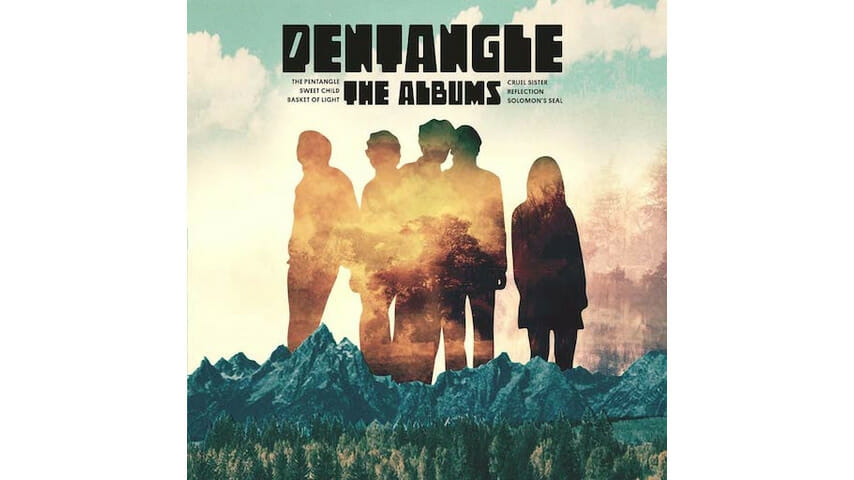
The original incarnation of Pentangle lasted only about six years or so, a relative blip in the dense history of folk and rock music. But to look at the band’s activity during that time reveals that the quintet packed two decades’ worth of work. The incomplete chronology tucked away in the thick booklet accompanying this boxed set lists gig after gig after gig, as well as TV and radio appearances and recording sessions that would yield the six full-lengths collected here. It’s little wonder the tight bond that Pentangle had early on quickly frayed before fully disintegrating in 1973?
What makes this collection especially remarkable, and absolutely essential for anyone interested in the history of the U.K. folk scene, is how little of that entropy translated to the finished albums. Each of the five LPs released during the band’s first and best period is a different shade of brilliant, deceptively showcasing the virtuosic talents of its instrumentalists (guitarists Bert Jansch and John Renbourn, bassist Danny Thompson and drummer Terry Cox) who gave the perfect framework for vocalist Jacqui McShee to gently break hearts and warm souls.
As all good boxed sets do, this new Cherry Red Records collection graciously expands the original albums within. Tacked on to the end of each disc is a smattering of studio outtakes, alternate versions and live material, much of it unreleased until now. The CD of Pentangle’s 1971 LP Reflection also includes a few tracks from Renbourn’s solo album Faro Annie, which featured Cox and Thompson. All of it provides an illuminating glimpse into the work that they put into sounding as laidback and effortless as they did. They sweated over their arrangements, trying different instrumentation and lineups to get It just so.
Even more exciting is the live material scattered throughout. The rigors of the studio sessions being removed, Pentangle came even more fully alive onstage. That’s clear enough on the live half of the 1968 double album Sweet Child, but I would recommend heading right for the three audience recordings appended to the disc of Solomon’s Seal, the last album made by the classic lineup. Recorded in 1972 at Guildford Civic Hall, the tracks find Pentangle in peak form, with Renbourn adding some psychedelic wah-wah pomp to “When I Get Home” and Cox, long the band’s secret weapon (check out his startling solo on “Bells” from The Pentangle for further proof), given ample room to give an almost funky edge to the proceedings.
A set like this is also a great source to get a full understanding of how a band evolves over any length of time. Through their six years together (and their various endeavors outside the fold), Pentangle gained strength and fire in their performances as they got more comfortable with each other’s playing. That’s clear by the time you hit Solomon’s Seal. While things were becoming more fractious among its members and with its former label Transatlantic, the group never lost its focus when making music together. In fact, that 1972 album wound up being their most complete statement. The original material is mature and thoughtful, with Jansch’s “No Love Is Sorrow” lingering longest in the system, and the traditional songs rambling and swaying delightedly.
The sound that Pentangle reached on their final album isn’t a huge leap beyond what is heard on their 1968 debut. But in their earliest recordings, there is a slight distance between the musicians evident as they settled into this exciting new project (not to mention, their insistence early on of using primarily acoustic instruments). As the group moved forward together, their individual sounds found those pockets and crannies to sink in and meld together into a sound that feels as cozy and current as anything being produced today.